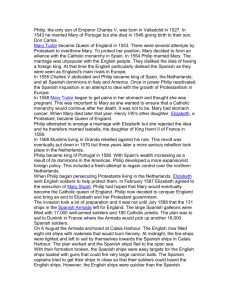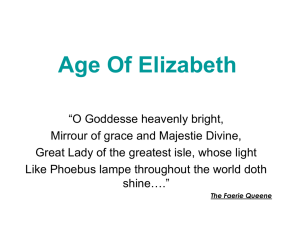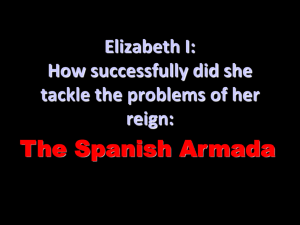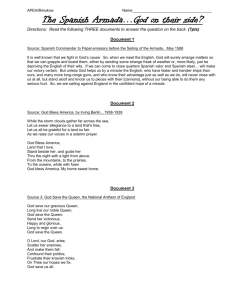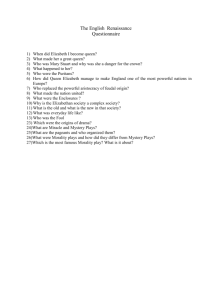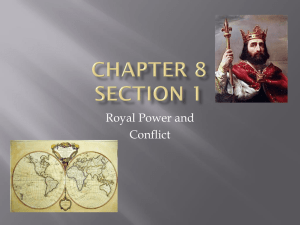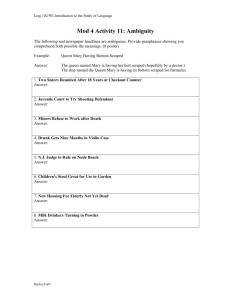the Skit - englishpriceperiod5
advertisement
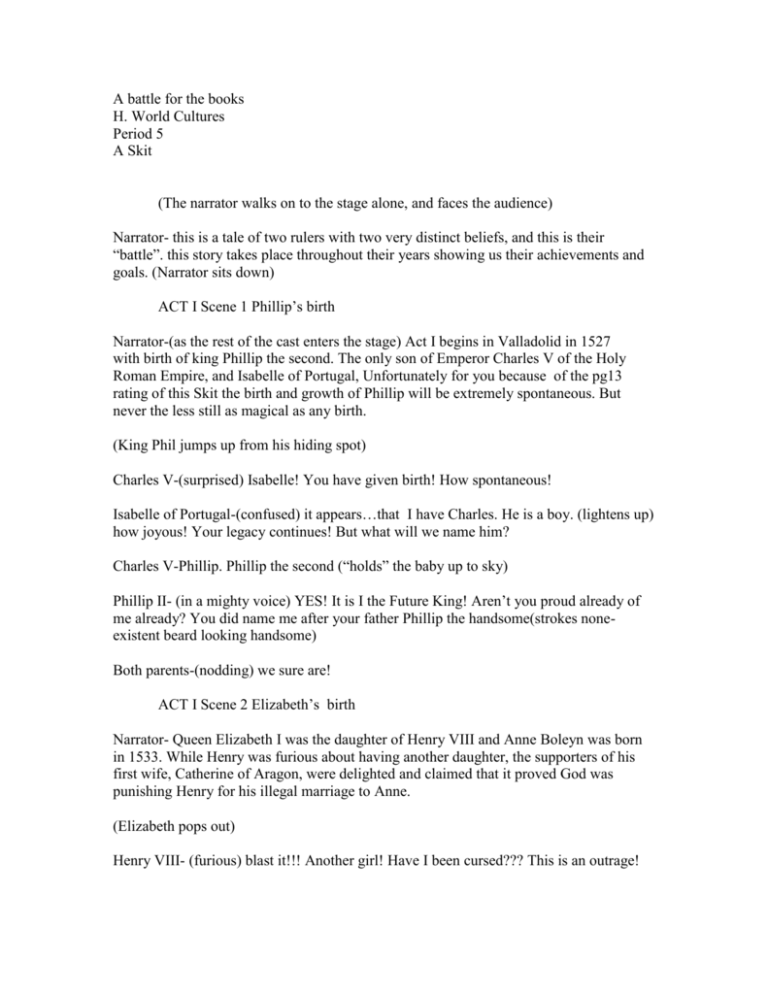
A battle for the books H. World Cultures Period 5 A Skit (The narrator walks on to the stage alone, and faces the audience) Narrator- this is a tale of two rulers with two very distinct beliefs, and this is their “battle”. this story takes place throughout their years showing us their achievements and goals. (Narrator sits down) ACT I Scene 1 Phillip’s birth Narrator-(as the rest of the cast enters the stage) Act I begins in Valladolid in 1527 with birth of king Phillip the second. The only son of Emperor Charles V of the Holy Roman Empire, and Isabelle of Portugal, Unfortunately for you because of the pg13 rating of this Skit the birth and growth of Phillip will be extremely spontaneous. But never the less still as magical as any birth. (King Phil jumps up from his hiding spot) Charles V-(surprised) Isabelle! You have given birth! How spontaneous! Isabelle of Portugal-(confused) it appears…that I have Charles. He is a boy. (lightens up) how joyous! Your legacy continues! But what will we name him? Charles V-Phillip. Phillip the second (“holds” the baby up to sky) Phillip II- (in a mighty voice) YES! It is I the Future King! Aren’t you proud already of me already? You did name me after your father Phillip the handsome(strokes noneexistent beard looking handsome) Both parents-(nodding) we sure are! ACT I Scene 2 Elizabeth’s birth Narrator- Queen Elizabeth I was the daughter of Henry VIII and Anne Boleyn was born in 1533. While Henry was furious about having another daughter, the supporters of his first wife, Catherine of Aragon, were delighted and claimed that it proved God was punishing Henry for his illegal marriage to Anne. (Elizabeth pops out) Henry VIII- (furious) blast it!!! Another girl! Have I been cursed??? This is an outrage! Anne Boleyn- now now dear she may not be a boy but she is still a gift from the lord. Elizabeth I- yes father, I am still your daughter. And I promise I will make you proud! ACT 2 Scene 1 the rise to power Narrator-Mary Tudor (Elizabeth’s older sister) became Queen of England in 1553. There were several attempts by Protestant to overthrow Mary. To protect her position, Mary decided to form an alliance with the Catholic monarchy in Spain. In 1554 Philip married Mary. The marriage was unpopular with the English people. They disliked the idea of having a foreign king. At that time the English particularly disliked the Spanish as they were seen as England's main rivals in Europe. In 1555 Charles V abdicated and Philip became king of Spain, the Netherlands, and all Spanish dominions in Italy and America. Once in power Philip reactivated the Spanish Inquisition in an attempt to deal with the growth of Protestantism in Europe. In 1558 Mary Tudor began to get pains in her stomach and thought she was pregnant. This was important to Mary as she wanted to ensure that a Catholic monarchy would continue after her death. (Mary is speaking to a doctor whom came to visit) Mary- so doctor what is (clutches stomach in pain) it? Doctor- I am sorry Queen you will not make it, for you are not pregnant… you have stomach cancer. Your reign as the catholic Queen will end with your death(Mary runs away crying. And the doctor walks up to Elizabeth.) I am sorry your sister will NOT make it. You will be the new Protestant Queen of England. ACT 2 Scene 2. The rejection Narrator- due to Mary’s death Elizabeth the first had become the Protestant queen of England. But because of marry’s death the alliance between Spain and England was no longer sealed by marriage and he had yet to have a son to take his place. Phillip-(goes up to the queen) as you may know your sister and I had been married and because of this marriage our countries have been in an alliance. Oh geez what I’m trying to say is (kneels down) will you marry me? Elizabeth-(laughs) do you REALLY expect me to marry YOU? Last time I checked you weren’t necessarily pro-protestant in fact you are against them, MY people, and you expect me to marry you? HA (turns and leaves the stage) Phillip II- you will pay, protestant. You dishonor me and my country and lost a great ally and gained a terrible foe. I will have my revenge. ACT 3 Scene One When Philip began persecuting Protestants living in the Netherlands, Elizabeth sent English soldiers to help protect them. In February 1587 Elizabeth agreed to the execution of Mary of Stuarts. Philip had hoped that Mary would eventually become the Catholic queen of England. Philip now decided to conquer England and bring an end to Elizabeth and her Protestant government. The invasion took a lot of preparation and it was not until July 1588 that the 131 ships in the Spanish Armada left for England. The large Spanish galleons were filled with 17,000 well-armed soldiers and 180 Catholic priests. The plan was to sail to Dunkirk in France where the Armada would pick up another 16,000 Spanish soldiers. On 6 August the Armada anchored at Calais Harbour. The English now filled eight old ships with materials that would burn fiercely. At midnight, the fire-ships were lighted and left to sail by themselves towards the Spanish ships in Calais Harbour. The plan worked and the Spanish ships fled to the open sea. With their formation broken, the Spanish ships were easy targets for the English ships loaded with guns that could fire very large cannon balls. The Spanish captains tried to get their ships in close so that their soldiers could board the English ships. However, the English ships were quicker than the Spanish galleons and were able to keep their distance. The English bombardment sank many Spanish galleons. Those that survived headed north. The English ships did not follow as they had run out of gunpowder. After the Armada rounded Scotland it headed south for home. However, a strong gale drove many of the ships onto the Irish rocks. Thousands of Spaniards drowned and even those that reached land were often killed by English soldiers and settlers. Of the 25,000 men that had set out in the Armada, less than 10,000 arrived home safely. In 1591 there was a revolt in Aragon against Philip's rule. Philip's military campaigns created severe financial problems and by 1596 his country was bankrupt. When Philip died in 1598 his empire was divided and economically depressed.
